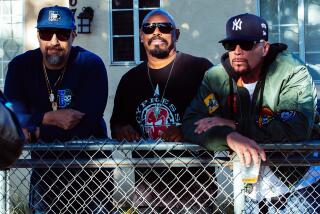NEW PBS SEASON REFLECTS A CONSERVATIVE MOOD
- Share via
NEW YORK — A sneak preview of the 1986-87 Public Broadcasting Service television season suggests few surprises for viewers of the non-commercial TV network.
Even the promise of three major new series indicates little in the way of change, reflecting a conservative mood within public broadcasting at a time when member stations are pressured financially and when viewers are indicating satisfaction with the current PBS schedule, which is in large part shaped by the stations.
In concluding a complex, computerized process of program selection this week, 154 of the country’s 178 public television stations chose 26 programs for next season’s schedule, at a cost to participating stations of $39 million.
For the most part, the schedule consists of programs such as “Great Performances,” “Nova,” “Sesame Street” and “Wall Street Week,” which long have been standard PBS fare, along with newer programs such as “American Playhouse,” “Frontline” and “The MacNeil/Lehrer NewsHour,” which seem to have found themselves a niche in PBS’ schedule.
According to Michael Patterson, the PBS official in Washington who administers the voting among stations, only four out of 14 proposed new programs were approved for next season’s schedule by the stations, and only after the programs’ producing stations guaranteed to cover a significant portion of their cost.
Three of them are for next season: “Adventure,” a series to be produced by “Frontline’s” executive producer, David Fanning; “American Masters,” a series on the arts, to be produced by New York’s WNET, and “The Day the Universe Changed,” a science series to be produced by South Carolina Education Television.
The fourth series to win approval was “Search for the Mind,” a sequel to last season’s series called “The Brain.” The money pledged now will provide the necessary “start-up funds” for production, but “Search for the Mind” is not scheduled to be broadcast until the 1987-88 season.
“It’s not exactly the kind of experimental, alternative programming that first was envisioned for public television,” one PBS official, who asked not to be identified, said of the stations’ selections.
The voting process that concluded this week began at an annual “program fare” held last fall in Philadelphia, at which station representatives from around the country gathered to reconsider programs on the current schedule and to consider proposals for new programs.
Even proposals that proved popular in Philadelphia, such as an off-beat comedy suggested by Chicago’s WTTW, failed to carry enough weight in the final voting process.
Only two programs in the current PBS schedule, “Owl TV” and “Onstage at Wolftrap,” failed to win enough votes to remain in next season’s schedule, according to Patterson.
“Certainly the stations seem to have taken a conservative approach, in terms of all the new stuff that is floating around out there,” Patterson said in evaluating the final vote. “But to keep what we’ve got costs a great deal of money, and they can only afford so much more at this point in time.”
More to Read
The complete guide to home viewing
Get Screen Gab for everything about the TV shows and streaming movies everyone’s talking about.
You may occasionally receive promotional content from the Los Angeles Times.






